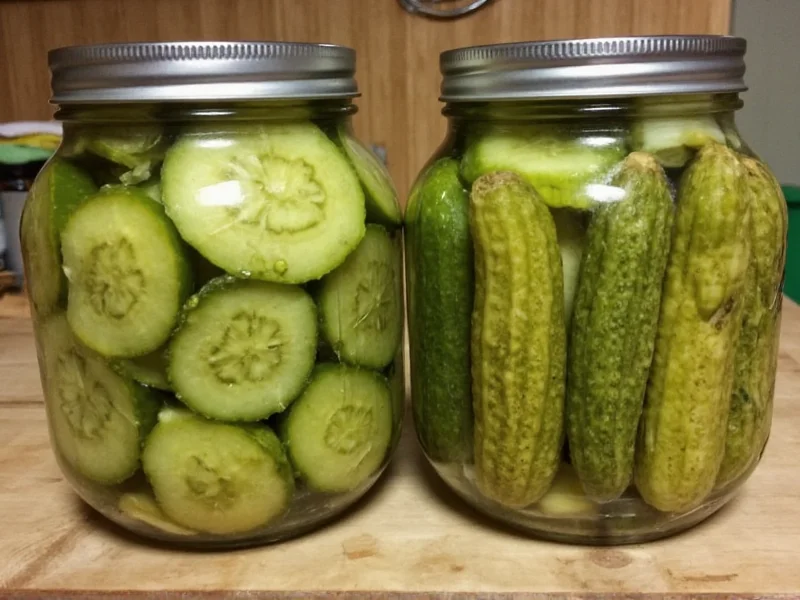Many home cooks and grocery shoppers wonder: are pickled cucumbers different from pickles? This common confusion stems from linguistic evolution rather than culinary distinction. Let's clarify this once and for all with factual insights about cucumber preservation terminology.
Understanding the Terminology
The word “pickle” originates from the Dutch “pekel,” meaning brine. Historically, “pickle” referred to the preservation process itself. Over time, English speakers began using “pickles” as a noun for the end product – specifically pickled cucumbers. This linguistic shift created the modern misunderstanding.
When you purchase “pickles” at any grocery store, you're buying pickled cucumbers. No supermarket sells “pickles” made from other vegetables under that single term. Other preserved vegetables always specify their base ingredient (e.g., “pickled beets,” “pickled onions”).
Historical Context of Pickle Terminology
Pickling dates back 4,000 years to ancient Mesopotamia. Early English texts used “pickle” as a verb (“to preserve in salt or vinegar”). By the 17th century, “pickle” became a noun referring to any preserved item. The cucumber-specific meaning emerged in 19th century America as cucumber pickling became culturally dominant.
This historical progression explains why modern usage specifies “cucumber pickles” only when distinguishing from other preserved vegetables. In everyday conversation, “pickles” alone always means pickled cucumbers.
The Pickling Process: Identical for Both Terms
Whether called “pickled cucumbers” or “pickles,” the preservation method remains unchanged:
- Fresh cucumbers (typically Kirby variety) are submerged in vinegar-based brine
- Brine contains salt, spices, and sometimes sugar
- Refrigerator pickles cure in days; fermented pickles require weeks
- Final product features characteristic sour, salty, crunchy texture
| Terminology Myth | Actual Culinary Reality |
|---|---|
| “Pickles” refers to multiple vegetables | “Pickles” exclusively means cucumbers unless specified otherwise |
| Pickled cucumbers are a different product | They're identical – just different phrasing |
| Commercial pickles use different methods | Same process, scaled for production |
Regional Language Variations
While “pickles = pickled cucumbers” holds true across English-speaking regions, some areas show interesting nuances:
- America: “Pickles” universally means cucumbers; other vegetables always include the base ingredient name
- UK: “Gherkins” often refers to small pickled cucumbers, while “pickles” can sometimes describe mixed vegetable preserves
- Australia: Similar to US usage, though “pickled onions” are commonly called “onion pickles”
These regional differences explain some confusion but don't change the fundamental fact: when someone says “pickles” without specification, they mean pickled cucumbers.
Why the Confusion Persists
Three factors perpetuate the pickled cucumbers vs pickles misunderstanding:
- Linguistic evolution: The shift from process name to product name created ambiguity
- Marketing language: Some brands use “pickled cucumbers” on labels to sound artisanal
- Other preserved vegetables: Seeing “pickled beets” leads some to assume “pickles” could mean multiple items
Understanding these factors helps clarify why people question whether are pickled cucumbers the same as pickles – they're not different products, just different ways of describing the same preserved cucumber.
Practical Implications for Cooks and Shoppers
When following recipes or shopping, remember these guidelines:
- “Pickles” in ingredient lists always means pickled cucumbers
- Recipes specifying “pickled cucumbers” aren't indicating a special variety
- International recipes may use “gherkins” for small pickled cucumbers
- Any recipe calling simply for “pickles” refers to cucumbers
This knowledge prevents unnecessary confusion when exploring homemade cucumber pickling techniques or comparing commercial pickle varieties. Whether you call them pickled cucumbers or pickles, you're working with the same versatile, tangy ingredient.
Conclusion: Terminology Clarity
The question are pickled cucumbers and pickles different has a definitive answer: they're identical. The distinction exists only in phrasing, not in product. Understanding this linguistic nuance helps home cooks, shoppers, and food enthusiasts navigate recipes and grocery aisles with confidence. When someone asks for pickles, they're always requesting pickled cucumbers – no exceptions in standard culinary terminology.
Frequently Asked Questions
Are pickles made from anything besides cucumbers?
No, when labeled simply as “pickles” without specification, the product always contains cucumbers. Other preserved vegetables must include their base ingredient name (e.g., “pickled beets”).
Why do some recipes say “pickled cucumbers” instead of “pickles”?
Recipes use “pickled cucumbers” for precision or stylistic reasons, but it refers to the exact same product as “pickles.” This phrasing sometimes appears in artisanal or international recipes.
Is there a difference in the pickling process for “pickles” versus “pickled cucumbers”?
No difference exists. Both terms describe cucumbers preserved through identical vinegar or fermentation methods. The terminology variation doesn't affect preparation techniques.
Why do people confuse pickled cucumbers with other pickled vegetables?
The confusion stems from seeing terms like “pickled beets” and assuming “pickles” could refer to multiple vegetables. In reality, “pickles” alone always means cucumbers in standard usage.
Do all cultures use “pickles” to mean cucumbers?
Most English-speaking cultures do, though the UK sometimes uses “pickles” for mixed vegetable preserves. In culinary contexts worldwide, “pickles” without specification refers to cucumbers.











 浙公网安备
33010002000092号
浙公网安备
33010002000092号 浙B2-20120091-4
浙B2-20120091-4